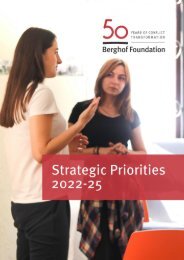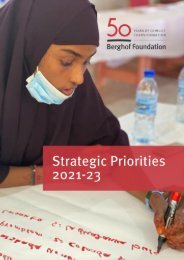Berghof Foundation: 50 years of conflict transformation
This book provides an overview of the Berghof Foundation’s work and impact over the past 50 years and sheds light on the challenges ahead of peacebuilding.
This book provides an overview of the Berghof Foundation’s work and impact over the past 50 years and sheds light on the challenges ahead of peacebuilding.
You also want an ePaper? Increase the reach of your titles
YUMPU automatically turns print PDFs into web optimized ePapers that Google loves.
The optimism <strong>of</strong> liberal peace, which we have<br />
seen in the 1990s, has gone and along with that ideas<br />
<strong>of</strong> interventionist power projection have lost their<br />
lustre. This in itself might have been a good thing.<br />
When paired with humility and an understanding that<br />
cookie-cutter solutions do not work, it could provide<br />
an opening for the nuanced alternatives we seek<br />
to provide.<br />
Unfortunately, at the same time, core<br />
liberal values have also lost their appeal as there<br />
is a growing view within the general public that<br />
democracy fails to deliver. It is tempting to ascribe<br />
this to orchestrated disinformation campaigns.<br />
As a standalone explanation, however, this smacks <strong>of</strong><br />
denial. The question itself is key and requires further<br />
exploration. I would suspect, though, that the larger<br />
<strong>transformation</strong>s our society is going through are an<br />
important factor. Clearly, the crumbling <strong>of</strong> the western<br />
liberal political consensus and the international order<br />
is creating an opening for totalitarianism.<br />
“<br />
To be successful in<br />
the long term, an<br />
organisation has to<br />
take risks and do<br />
things beyond the<br />
mainstream.<br />
In such a context, there is a need, now more<br />
than ever, for spaces for thoughtful reflection, where<br />
people in <strong>conflict</strong> can come together in search for<br />
workable alternatives. For us, as much as for those<br />
whom we seek to engage, this means keeping an<br />
open mind and ascribing new meaning to the things<br />
we hold dear, and not confusing the manifestations <strong>of</strong><br />
our values with the values themselves. Alone, we can<br />
achieve nothing: the challenges we face can only be<br />
solved through collaboration.<br />
Our field has grown considerably in the past <strong>50</strong> <strong>years</strong><br />
and today we are accompanied by a number <strong>of</strong> likeminded<br />
organisations that work towards the same<br />
goal. Is there still a niche for <strong>Bergh<strong>of</strong></strong> and why is<br />
the ‘<strong>Bergh<strong>of</strong></strong> approach’ to <strong>conflict</strong> <strong>transformation</strong><br />
still needed?<br />
There’s a story that when someone in<br />
the <strong>Bergh<strong>of</strong></strong> <strong>Foundation</strong> asked my father for his<br />
judgement on the work being done, he replied:<br />
“I do not think that I can judge it fully, but when I open<br />
the newspaper today I can tell that you are not doing<br />
enough.” That still applies today. It is great to see that<br />
the field has grown, but it is still miniscule, not only<br />
in the face <strong>of</strong> the challenges it seeks to address, but<br />
also in terms <strong>of</strong> the resources it can attract. I have no<br />
doubt that our approach, with its strong grounding in<br />
principles, does have a place in it. But so do others.<br />
When it comes to addressing issues on the ground,<br />
though, we should work together in the interest <strong>of</strong><br />
our beneficiaries. We should also work together<br />
to promote the field and develop well-founded<br />
arguments that can convince like-minded donors<br />
to provide support.<br />
Our anniversary falls at a special and very challenging<br />
time. The pandemic has brought suffering and a halt<br />
to public life in many countries we are engaged in. It<br />
has changed the way we work and communicate, and<br />
will also have an enormous economic and financial<br />
impact. How do you think it will affect our work in the<br />
long run? And how will we navigate in this tightened<br />
fiscal space?<br />
This crisis, like any other, creates<br />
opportunities as well as risks. We have seen the<br />
adoption <strong>of</strong> information technologies on an<br />
unprecedented scale. For us, like many others, it has<br />
become clear that while it is important to meet face<br />
to face once in a while, it is not always essential to<br />
hop on a plane. Online events and training can be a<br />
cost-effective and environmentally friendly means <strong>of</strong><br />
gaining outreach, as compared to in-person meetings.<br />
At the same time, the economic cost <strong>of</strong> the<br />
pandemic has negatively affected our ability to raise<br />
and spend funds. Although the challenge <strong>of</strong> this<br />
crisis has generally been met with an expansion <strong>of</strong><br />
government budgets, funding priorities have shifted<br />
away from our field. On top <strong>of</strong> that, we are facing<br />
“<br />
Part <strong>of</strong> the success <strong>of</strong> this organisation has<br />
been due to its ability to transform itself and<br />
adapt to changing conditions.<br />
the challenge <strong>of</strong> implementing projects in a time <strong>of</strong><br />
travel restrictions. Beyond that and maybe more<br />
importantly, I do see a cause for concern about the<br />
long-term implications <strong>of</strong> decades <strong>of</strong> monetary<br />
expansion. With inequality, social tensions and the<br />
general fragility <strong>of</strong> the system on the rise, it is hard to<br />
see how this situation can be unwound without major<br />
disruptions. Financial resilience is therefore high up<br />
on our agenda. We are actively seeking to develop<br />
new partnerships, both private and public.<br />
Looking ahead, we are entering our sixth decade<br />
in a new <strong>of</strong>fice, with a newly appointed Executive<br />
Director and a new strategy. Where do you see the<br />
<strong>Bergh<strong>of</strong></strong> <strong>Foundation</strong> at the end <strong>of</strong> this decade?<br />
The pandemic aside, the past few <strong>years</strong> have<br />
been eventful for <strong>Bergh<strong>of</strong></strong>, as the organisation has<br />
expanded rapidly over the past ten <strong>years</strong>. With a new<br />
<strong>of</strong>fice located in central Berlin and new leadership<br />
in place, now is the time to look ahead and focus on<br />
the future.<br />
It seems to me, though, that more than ever<br />
in my lifetime, the view is clouded by uncertainty.<br />
Over the past <strong>years</strong>, we in the West had to learn<br />
a lesson that may already have been common<br />
knowledge elsewhere, which is that nothing can<br />
be taken for granted. Navigating these waters<br />
requires both humility and a compass <strong>of</strong> strong<br />
values, without jumping to conclusions. These traits<br />
I see as some <strong>of</strong> our strengths. My wish for the next<br />
decade is that we will succeed in applying them<br />
to make a positive contribution in the numerous<br />
<strong>transformation</strong>s that lie ahead and thus stay relevant<br />
without losing ourselves.<br />
Transformation will indeed be required if we look at<br />
the numerous challenges that lie ahead. Throughout<br />
our organisational history, the challenges that were<br />
brought about by the historical and political context<br />
have always shaped our strategic priorities. We have<br />
left old focal areas behind and have explored new<br />
ones. Today, we are faced with a number <strong>of</strong> new<br />
crises and macro-historical changes — above all<br />
probably the biggest challenge to humanity yet,<br />
climate change. How will it affect our work and our<br />
strategic priorities?<br />
It is certainly right that part <strong>of</strong> the success<br />
<strong>of</strong> this organisation has been due to its ability to<br />
transform itself and adapt to changing conditions.<br />
In hindsight, the main shift has been that from a more<br />
activist position to a more diplomatic one, which<br />
was related to the shift in geographical focus from<br />
Germany to abroad. Beyond that, our understanding<br />
<strong>of</strong> <strong>conflict</strong> <strong>transformation</strong> as an open format<br />
approach has enabled us to respond pragmatically<br />
to contextual requirements. Consequently, we have<br />
been able to flexibly integrate different cross-cutting<br />
issues into our work, when relevant.<br />
This may be different for climate change<br />
and the ongoing digital revolution, two new<br />
areas we are looking into and whose impact on<br />
the world cannot possibly be understated. I am<br />
personally convinced that many <strong>of</strong> the social and<br />
political disruptions we have been witnessing in<br />
recent <strong>years</strong> are at least in part causally related<br />
to environmental and technological change.<br />
This relationship, however, needs to be better<br />
understood before we can draw conclusions. Rather<br />
than trying to duplicate what is already being done,<br />
we must seek collaboration with others to carve<br />
out a complementary understanding <strong>of</strong> what these<br />
developments mean for <strong>conflict</strong> <strong>transformation</strong>.<br />
14<br />
15










